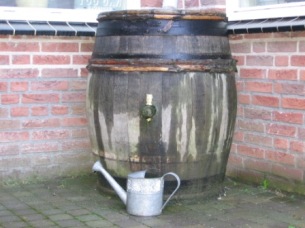Rainwater Filtration
Reviews and Recommendations for Best Filter Systems
by Anonymous
USA
Note: As an Amazon Associate I earn from qualifying purchases.
QUESTION:
I am installing a rainwater harvesting system and wonder what the best treatment system will be for drinking water.
I thought R.O. would be the best option, but you have said that is not true. What is the best option here?
ANSWER:
The best rainwater filtration depends on the type of rainwater harvesting system you are installing.
Does it collect and store rainwater outside in a barrel/container or is it also hooked up to your water system?
If the rainwater harvesting system collects the water in a barrel or other container, then I would recommend filtering the rainwater through a high-quality water filter dispenser, such as those recommended on this page:
Water Filter Dispenser – Reviews and Recommendations
If it connects to your drinking faucet via your water system, then I would recommend a high-quality, multi-stage under sink or counter top water system.
You can see my reviews for these water filter systems on the following pages:
Under Sink Water Filters – Reviews and Recommendations
Countertop Tap Water Filter – Reviews and Recommendations
Reverse Osmosis for Rainwater Filtration
As you may have read on my site, one of the main reasons I do not recommend drinking reverse osmosis water for long-term use is because the water that is purified by this method is demineralized and acidic.
It is fine to drink purified drinking water on occasion for body cleansing or short-term use. However, I do not recommend it for daily, ongoing use.
Since rainwater contains little or no minerals, as compared to ground-water, some might argue that using a reverse osmosis system as opposed to a multi-stage carbon filter (which I normally recommend for tap water) is not going to make a huge difference.
However, I also believe that a multi-stage carbon filter is more effective at removing waterborne contaminants than reverse osmosis.
You can read more here (if you haven’t already seen this page): Reverse Osmosis Disadvantages.
Thus, whether you use a multi-stage carbon filter or reverse osmosis for filtration, I would recommend you add liquid ionic minerals, such as Trace Minerals to your filtered rain water and/or an unrefined natural sea salt, such as Celtic sea salt, to your water or food.
P.S. If you can give me more specific information about your rainwater harvesting system and how you will collect/use the water, I will try to offer a specific filter recommendation.
Further reading . . .
Drinking Rain Water – Health Advantages and Disadvantages
Drinking Rainwater – An Effective Way to Conserve Water
Return from Rainwater Filtration to Filtered Drinking Water
If you would like to reproduce or republish this article or any other article on this site, feel free to do so but please include a reference or link to the article at WaterBenefitsHealth.com.
Sign Up for Our Monthly
Newsletter
Visitor Comments
"This was the best and most straight forward info on the net yet. I asked a question and got an answer that made sense. Thank you so much!" - Linderlinder
FINALLY!!! I have been wondering about this for years with no 'solid' answer. This is exactly what I've been wanting to know! Thank you for this share..." by Andy
"Thank you for the information, Nancy. I appreciate it. Your article and findings are very helpful, referring to dehydration." - Carolyn
"Lemon water is one drink both my wife and I can't drink. It upsets our stomachs. We are in our sixties and in very good health—well, better health now that we drink about 2 liters plus of water each day. It has made so much difference to our digestive systems and recovery every day. Thank you for your website and effort." - Rod



